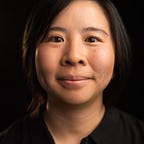Yellow is for banana
Even still, with careful banter and calling out racist comments, I face microaggressions when people ask me where I’m from. A simple question, but to me it’s one that suggests they think I don’t quite belong.
I have never been explicitly called yellow, but I have been called a banana: yellow on the outside, white on the inside. I am an American-born Chinese, but I’m supposedly too American, to the point where I don’t fit in with my Chinese community.
Growing up in a predominantly white, Protestant town on the east coast of the United States, I knew I was the token Asian. To my white friends, I was “very” Asian. I looked different than them, with my thick black hair, high cheekbones and, as my third grade classmate pointed out, my “flat face”. I was quiet, obedient, and, as the stereotypes presumed, super smart.
But I wasn’t. I never got straight A’s. Kids would try to cheat off my maths papers. I sucked at maths. At the second grade talent show, I played “Twinkle Twinkle Little Star” on the piano. Jon Shih played Beethoven.
I had two identities without even knowing it. I would go to school, gossip about celebrities with friends, scarf down slices of pizza and get another D in maths. Then I’d go home, wear slippers around the house, listen to Hong Kong ballads and hand wash all of my dishes — even though we had a dishwasher. These two sides are what make me Eden, though, an Asian American, an American-born Chinese.
Yet to everyone else, I had to be one or the other.
I didn’t find out that I was a “banana” until university, when I started hanging out with, as they referred to themselves, “actual Asians”. My new Indonesian, Singaporean and Japanese friends immediately pointed out my Americanisms, like small sores that kept me from being fully initiated into their exclusive club. According to them, I was an “other” in a multitude of ways, through my fluent English and my choppy Chinese, my taste in films and music, in my humour and even my personality.
I’m used to people saying fake Chinese words around me, as they pull their eyes back to mimic stereotypes that aren’t even relevant to me with my slightly bigger eyes. I never asked for it. That is the problem with being other.
Now, I actively try to avoid any stereotypes to make sure those around me know my heritage is not something to make fun of. I won’t be the first one to tell jokes about Asians anymore because I am the floodgate. And if that floodgate opens, the racist jokes and insensitive comments start rushing out.
Even still, with careful banter and calling out racist comments, I face microaggressions when people ask me where I’m from. A simple question, but to me it’s one that suggests they think I don’t quite belong. “Where are you from?” implies that I am not one of them, that I am not American.
I was optimistic a few years ago. I’d think, “Maybe this time they really are just wondering where I’m from.” But then I see their faces fall when I name my east coast town. It’s not what they expect when they see yellow, but get white. They don’t expect me, a banana.
Written for a London publication—hence the localizations like “maths” and “university”—on the theme Yellow. Reposted here on Medium.
